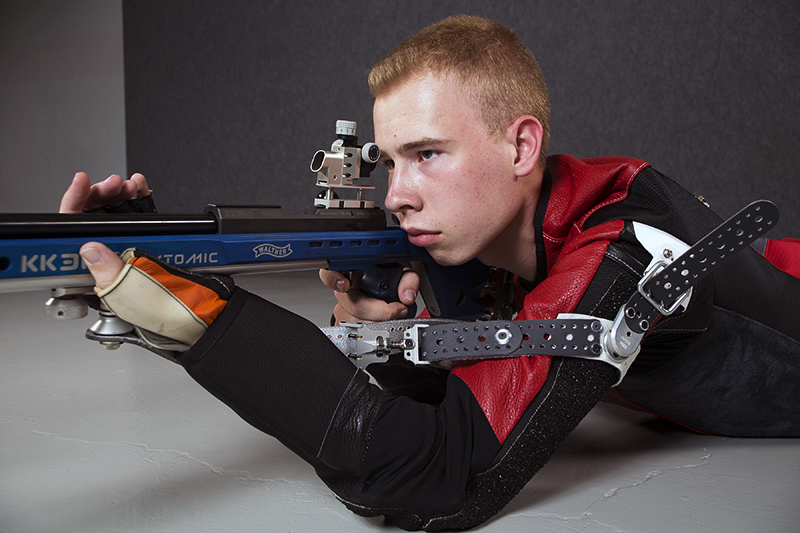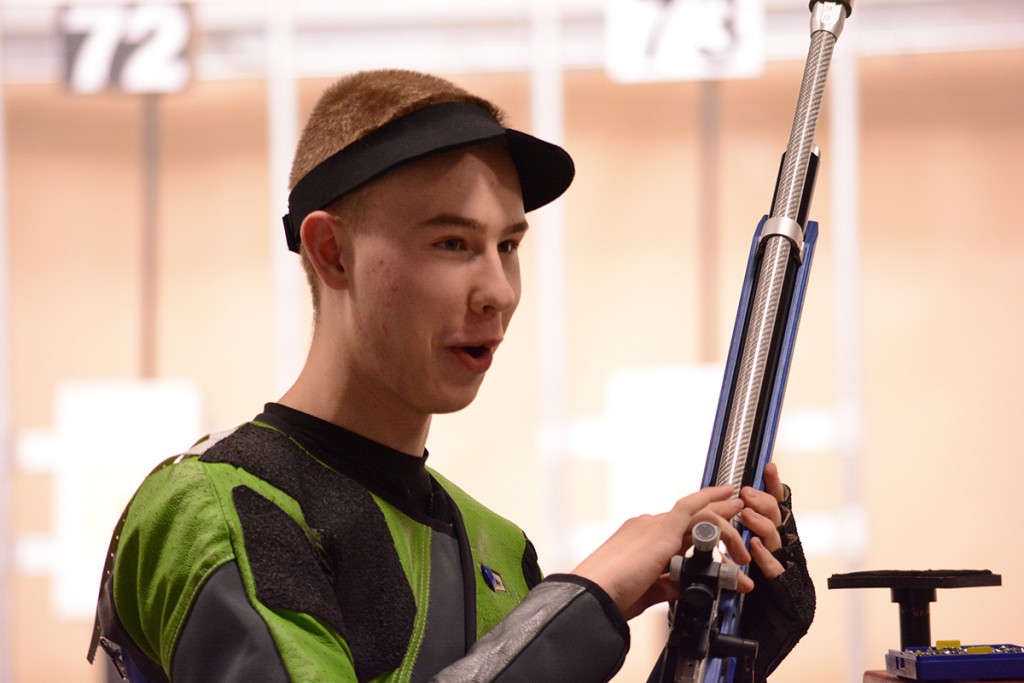What It’s Like to Shoot in College – And How to Get There, Part 1 – Michael Steinel, OSU
April 22, 2016
Civilian Marksmanship Program▸The First Shot▸What It’s Like to Shoot in College – And How to Get There, Part 1 – Michael Steinel, OSUBy Ashley Brugnone, CMP Writer
For some juniors, moving their shooting careers from high school into college is an indispensable goal. It’s the chance to compete at an even higher level of competition, while also gaining a worthwhile and valuable education. But a lot of juniors, coaches and parents have absolutely no idea where to start in getting their athletes onto college teams – or what to expect when they get there.
The following series highlights questions asked of current college student athletes and coaches – some of whom are alumni of the Civilian Marksmanship Program. The series will cover how juniors can gain college attention, what they can expect in college as both athletes and students, as well as the sort of qualities coaches look for in their athletes – answered by those with first-hand experience.

Michael Steinel, The Ohio State University, Freshman
1.) What is your hometown? Marietta, Ohio
2.) What is your shooting background? What team(s) did you previously shoot for? Any accolades?
Shot for Great Trail Musketeers in Ohio
· Air Rifle Distinguished, 2013
· 2014 Ohio Junior Olympic champion
· First place overall, 3×20 and 60 Shot Rifle – 2015 Monthly Match League
· Second place 3×20 – 2015 Camp Perry Open
· Overall Open competitor – 2015 Camp Perry Open
Among many other accolades

3.) Current Major: Security and Intelligence (International Studies) Minor: Russian
He hopes to go into the FBI after college. He also admits that learning a Foreign Language his first semester has been tricky! But also exciting.
4.) How did you go about deciding which college was right for you to attend?
“I kind of looked at what teams were shooting what kinds of scores, and then I narrowed it down to my favorites. I visited with my favorites, then decided which teams I felt the most comfortable with. You can’t thrive in an area that you’re not comfortable in.”
5.) What do you feel are the differences between shooting in college and shooting in high school?
“First off, I train on Megalink targets every day, which is great. No more paper targets,” he joked.
“One major difference for me is that every time I go into practice, I’m practicing with teammates. We have open practice, so you can come in any time of the day and practice, but we have a big enough team that there’s always someday in there.
For me, as a junior, I was only able to practice in the evenings with one or two teammates, maybe four. So that was a big change for me – always having people around me, practicing. For a while, I spent a lot of nights just Dad and I at the range.”
“[Being in college] is just a different atmosphere. We’ve got teammates that all get along. We know where everyone struggles. So if someone needs help with air rifle, we can talk it out a little – with kneeling or whatever.”

6.) Smallbore is another part of being on a collegiate team. What did you think when you learned you’d have to shoot smallbore as well? What are the challenges of having to practice/shoot both air rifle and smallbore?
“I hadn’t shot it much before, but I was more of an air rifle person. I was up at CMP all the time – at least once a month. At my range, it was kind of challenging to practice smallbore.
All of a sudden, I had to go from training in smallbore once a week and air rifle the rest of the week, to balancing it out. That is a different thing. If you get there and you’re the person who really shot air, don’t be discouraged if your air goes down and your smallbore slowly comes up. They’ll both level out.”
7.) What are some things about college (shooting or outside of) that surprised you, that you may have not expected?
For me personally, the amount of time that you need to spend outside of a class studying, not just doing homework, but studying – that was a big change between high school and college. From a shooting aspect, we (coach and I) kind of knew where I was with everything. We had a plan.”
But, to find out about what it’s like at a particular college, “Talk to your teammates. See what their advice is on anything. To me, you have to have a team that will do anything for you. And you you have to be a teammate who will do that for them.”
8.) What do you enjoy about shooting in college?
“My team is great. Also, one of the reasons that I went to Ohio State is the atmosphere that even if your team hasn’t (5:00) …they’re waiting for you to. The football team, basketball, all of these other sports are doing great, and then there are teams that haven’t yet, but you still expect, ‘This is Ohio State. We can do this.’ It’s kind of a cool thing.”
He added, “I love the campus. I love my team.”
But admittedly…
“I grew up in Ohio, and I never wanted to go to Ohio State. I was always anti-Ohio State because it was such a stereotype for people in my area to go there. And then, coach came four years ago, and he’s a really good coach. He’s recruiting good shooters that are my friends. Then I visited, and I just loved campus.”
9.) Any advice for other juniors who may be looking to take their shooting career onto college? How should they get started?
“The biggest thing is getting in contact with coaches, and don’t be discouraged if they don’t email you back. Sometimes there are NCAA rules as to why they won’t – sometimes they’re just really busy. Coaches are overworked. But you can’t let that discourage you.
I know a lot of shooters who had given up on schools, and then later on the coach goes, ‘Well I was really interested in you! You stopped emailing me…’ and you can’t really say whose fault that is, but definitely don’t get discouraged with that.”
He added, “And go to where you’re comfortable.”
10.) How did the CMP help prepare you for collegiate shooting?
“CMP, especially Camp Perry, but also Anniston – I kind of learned how to handle the stresses of a match, because I was shooting there once a month. And, there for a while, I was at nearly National-level competition once a month. That’s where I learned to shoot finals – that’s where I got good at finals. Perry definitely, definitely trained me for that.”
11.) What are you looking forward to in your future? (Shooting or otherwise)
“I’m looking forward to helping build our program. (This year) was the first time we’ve made NCAAs since 1991 – the first time in my lifetime.”
“I’m really excited to get better at Russian. I’m really looking forward to actually being able to speak Russian, instead of these little bits and pieces.”
“Working with the team and academics the next four years – it’s all really exciting. I’m really excited.”